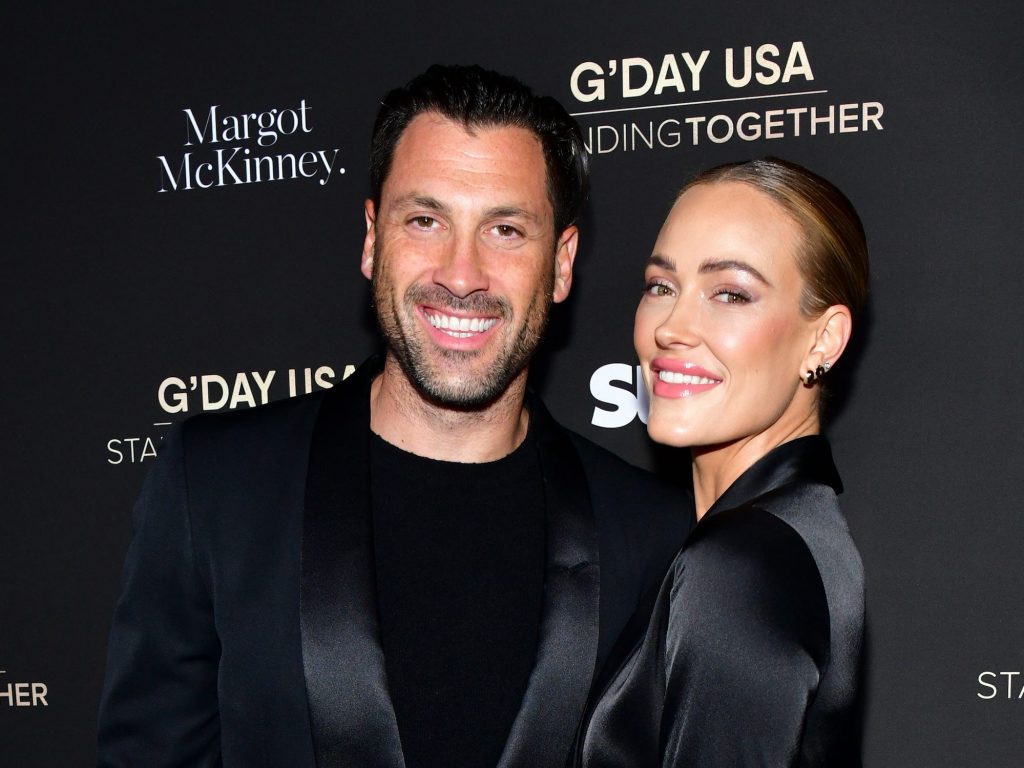- Dancer Peta Murgatroyd revealed in a People cover story that she's had three miscarriages.
- She had her first loss in fall 2020 and her third while sick with COVID-19 and unaware she was pregnant.
- "I had no strength," she recalled of her experience with COVID. "My breath was starting to be affected."
Former "Dancing With the Stars" professional dancer Peta Murgatroyd told People in an interview published on Tuesday that she had a miscarriage in October 2021 while she was also sick with COVID-19. Her husband Maksim Chmerkovskiy was working overseas in Ukraine as a judge on a dancing show at the time, and Murgatroyd was unaware that she was pregnant.
"I had no strength. I couldn't open a dishwasher. I couldn't open the fridge to feed Shai, to get him some toast," she said, referring to the couple's 5-year-old son. "It got so bad that my breath was starting to be affected. It was really dramatic."
Murgatroyd called for an ambulance from the floor of Shai's bedroom, where she was unable to move. Chmerkovskiy was on speakerphone from Ukraine when the doctor told Murgatroyd she had miscarried and he misheard the doctor's words.
"He said, 'Did you know you were pregnant?'" Murgatroyd recalled the doctor asking. From overseas via a phone laying on her chest, Murgatroyd said that her husband incorrectly heard the doctor say "you're pregnant" and was overjoyed before realizing the actual news was that she'd lost the pregnancy.
Murgatroyd said she had started bleeding two days earlier but thought she was having her period. She said she thinks not knowing she was pregnant for the third time "was better for my recovery because I didn't have that super joyous moment of, 'I'm pregnant again!'"
"I just had the moment of, 'You lost it,'" she continued.

Pregnancy increases the risk of complications from COVID-19 — including severe illness, hospitalization, and death — due to changes to the immune system and added stress on the heart and lungs. The US Centers for Disease Control and Prevention found in November 2021 that the association works both ways: having COVID-19 was linked to a greater risk of stillbirth and miscarriage.
The dancer had two prior miscarriages

In the interview with People, Murgatroyd said she had her first miscarriage in the fall of 2020 while she was competing as a pro on "DWTS." She said she went back to work just two days after the experience.
"I was completely embarrassed, ultimately ashamed. I didn't even know how to utter the words and have that sentence come out of my mouth: I had a miscarriage," she said. "I'm somebody who prides herself on health wellness. I exercise every single day. But as I came to realize, that doesn't really go hand-in-hand with the reproductive system."
She miscarried for the second time nine months after her first miscarriage. In the meantime, commenters on social media were asking questions like, "How could you not have another baby?" and insisting that her son should have a sibling, she recalled.
"The 'how could you not' threw me off a ledge," she said in a video accompanying the cover story. "I was like, 'if only you knew what was actually going on with my family, you would never say that.'"
Murgatroyd said her doctors believe she has a hormonal imbalance

Murgatroyd said doctors think she has Polycystic Ovary Syndrome (PCOS), a hormonal disorder that can impact fertility and pregnancy. About one in every 10 women of childbearing age have PCOS, and many don't find out until they're trying to get pregnant, according to the US Department of Health and Human Services.
Doctors previously told Insider that people with PCOS may have trouble conceiving because the imbalance of hormones can cause irregular periods. PCOS is also associated with a three-fold increased risk of early pregnancy loss, as well as other complications during pregnancy.
The "DWTS" couple is working with fertility specialists to get pregnant again, Murgatroyd said. Assisted reproductive technologies like in vitro fertilization (IVF) may help people with PCOS get pregnant, but other factors like age and weight also impact success rates. Doctors may also prescribe medication to jump-start the hormones that trigger ovulation, Insider reported.
